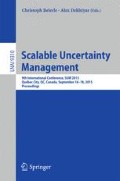Abstract
An argumentation system can undergo changes (addition or removal of arguments/interactions), particularly in multiagent systems. In this paper, we are interested in dynamics of abstract bipolar argumentation systems, i.e. argumentation systems using two kinds of interaction: attacks and supports. We propose change characterizations that use and extend previous results defined in the case of Dung abstract argumentation systems.
Access this chapter
Tax calculation will be finalised at checkout
Purchases are for personal use only
Notes
- 1.
- 2.
It generalizes mediated, supported and also the “super-mediated attack” defined in [14].
- 3.
Other works could be considered for addressing the issue of incremental computation in a dynamic context. [5] for instance presents a more general approach dealing with modularity in abstract argumentation, based on the partition of an argumentation framework in interacting subframeworks. However, the application to our purpose is not straightforward and requires further investigation.
- 4.
Let S be a set, |S| denotes the cardinality of S.
- 5.
A second case, referred as “monotony from \({\mathcal {G}}'\) to \({\mathcal {G}}\)”, has been described in [9]. It is not used in this paper.
- 6.
This property is described in [8] and only considers the status of an argument after the change without taking into account the evolution of extensions. Of course, many other possibilities could be defined (e.g. combining extensiveness and monotony).
- 7.
In this case, \({\mathsf{BAS}}\) is reduced to an AS. So \({\mathsf{BAS}}\), its reduction \({\mathsf{AS}}\) and \({\mathsf{AS}^{\mathsf{BAS}}}\) collapse.
References
Amgoud, L., Cayrol, C.: A reasoning model based on the production of acceptable arguments. Ann. Math. Artif. Intell. 34, 197–216 (2002)
Amgoud, L., Cayrol, C., Lagasquie-Schiex, M.C., Livet, P.: On bipolarity in argumentation frameworks. Intl. J. Intell. Syst. 23, 1062–1093 (2008)
Amgoud, L., Maudet, N., Parsons, S.: Modelling dialogues using argumentation. In: Proceedings of ICMAS, pp. 31–38 (2000)
Amgoud, L., Vesic, S.: A formal analysis of the role of argumentation in negotiation dialogues. J. Logic Comput. 22, 957–978 (2012)
Baroni, P., Boella, G., Cerutti, F., Giacomin, M., van der Torre, L., Villata, S.: On the input/output behavior of argumentation frameworks. Artif. Intell. 217, 144–197 (2014)
Baroni, P., Caminada, M., Giacomin, M.: An introduction to argumentation semantics. Knowl. Eng. Rev. 26(4), 365–410 (2011)
Baroni, P., Giacomin, M., Liao, B.: On topology-related properties of abstract argumentation semantics. A correction and extension to dynamics of argumentation systems: a division-based method. Artif. Intell. 212, 104–115 (2014)
Baumann, R.: What does it take to enforce an argument? Minimal change in abstract argumentation. In: Proceedings of ECAI, pp. 127–132. IOS Press (2012)
Bisquert, P., Cayrol, C., Dupin de Saint Cyr Bannay, F., Lagasquie-Schiex, M.C.: Characterizing change in abstract argumentation systems. In: Ferm, E., Gabbay, D., Simari, G. (eds.) Trends in Belief Revision and Argumentation Dynamics. Studies in Logic, vol. 48, pp. 75–102. College Publications (2013)
Boella, G., Gabbay, D.M., van der Torre, L., Villata, S.: Modelling defeasible and prioritized support in bipolar argumentation. Ann. Math. AI 66, 163–197 (2012)
Booth, R., Kaci, S., Rienstra, T., van der Torre, L.: A logical theory about dynamics in abstract argumentation. In: Liu, W., Subrahmanian, V.S., Wijsen, J. (eds.) SUM 2013. LNCS, vol. 8078, pp. 148–161. Springer, Heidelberg (2013)
Cayrol, C., Lagasquie-Schiex, M.C.: On the acceptability of arguments in bipolar argumentation frameworks. In: Godo, L. (ed.) ECSQARU 2005. LNCS (LNAI), vol. 3571, pp. 378–389. Springer, Heidelberg (2005)
Cayrol, C., Lagasquie-Schiex, M.C.: Coalitions of arguments: a tool for handling bipolar argumentation frameworks. Intl. J. Intell. Syst. 25, 83–109 (2010)
Cayrol, C., Lagasquie-Schiex, M.C.: Bipolarity in argumentation graphs: towards a better understanding. IJAR 54(7), 876–899 (2013)
Cayrol, C., Lagasquie-Schiex, M.C.: Change in abstract bipolar argumentation systems. Technical report RR-2015-02-FR, IRIT (2015). http://www.irit.fr/publis/ADRIA/PapersMCL/Rapport-IRIT-2015-02.pdf
Cohen, A., Gottifredi, S., García, A.J., Simari, G.R.: An approach to abstract argumentation with recursive attack and support. J. Appl. Logic (2014)
Coste-Marquis, S., Konieczny, S., Mailly, J.-G., Marquis, P.: A translation-based approach for revision of argumentation frameworks. In: Fermé, E., Leite, J. (eds.) JELIA 2014. LNCS, vol. 8761, pp. 397–411. Springer, Heidelberg (2014)
Doutre, S., Herzig, A., Perrussel, L.: A dynamic logic framework for abstractargumentation. In: Proceedings of KR, pp. 62–71. AAAI Press (2014)
Dung, P.M.: On the acceptability of arguments and its fundamental role in nonmonotonic reasoning, logic programming and n-person games. Artif. Intell. 77, 321–357 (1995)
Gabbay, D.M.: Logical foundations for bipolar and tripolar argumentation networks: preliminary results. J. Logic Comput. (2013)
Karacapilidis, N., Papadias, D.: Computer supported argumentation and collaborative decision making: the hermes system. Inf. Syst. 26(4), 259–277 (2001)
Nouioua, F.: AFs with necessities: further semantics and labelling characterization. In: Liu, W., Subrahmanian, V.S., Wijsen, J. (eds.) SUM 2013. LNCS, vol. 8078, pp. 120–133. Springer, Heidelberg (2013)
Nouioua, F., Risch, V.: Bipolar argumentation frameworks with specialized supports. In: Proceedings of ICTAI, pp. 215–218. IEEE Computer Society (2010)
Nouioua, F., Risch, V.: Argumentation frameworks with necessities. In: Benferhat, S., Grant, J. (eds.) SUM 2011. LNCS, vol. 6929, pp. 163–176. Springer, Heidelberg (2011)
Oren, N., Norman, T.J.: Semantics for evidence-based argumentation. In: Proceedings of COMMA, pp. 276–284 (2008)
Oren, N., Reed, C., Luck, M.: Moving between argumentation frameworks. In: Proceedings of COMMA, pp. 379–390. IOS Press (2010)
Polberg, S., Oren, N.: Revisiting support in abstract argumentation systems. In: Proceedings of COMMA, pp. 369–376. IOS Press (2014)
Prakken, H.: On support relations in abstract argumentation as abstraction of inferential relations. In: Proceedings of ECAI, pp. 735–740 (2014)
Verheij, B.: Deflog: on the logical interpretation of prima facie justified assumptions. J. Logic Comput. 13, 319–346 (2003)
Author information
Authors and Affiliations
Corresponding author
Editor information
Editors and Affiliations
Rights and permissions
Copyright information
© 2015 Springer International Publishing Switzerland
About this paper
Cite this paper
Cayrol, C., Lagasquie-Schiex, MC. (2015). Change in Abstract Bipolar Argumentation Systems. In: Beierle, C., Dekhtyar, A. (eds) Scalable Uncertainty Management. SUM 2015. Lecture Notes in Computer Science(), vol 9310. Springer, Cham. https://doi.org/10.1007/978-3-319-23540-0_21
Download citation
DOI: https://doi.org/10.1007/978-3-319-23540-0_21
Published:
Publisher Name: Springer, Cham
Print ISBN: 978-3-319-23539-4
Online ISBN: 978-3-319-23540-0
eBook Packages: Computer ScienceComputer Science (R0)

